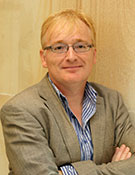The TC Beirne School of Law is enjoying a research renaissance, charting a 68 percent increase in research income according to deputy head Professor Simon Bronitt.
 “Our funding success has been very exciting and the school is on an extremely good trajectory performing well with all research outputs, including publications and research higher degree students,” Prof Bronitt said.
“Our funding success has been very exciting and the school is on an extremely good trajectory performing well with all research outputs, including publications and research higher degree students,” Prof Bronitt said.
“Our outstanding international and interdisciplinary researchers have attracted substantial grant funding and prestigious fellowships.”
In recent years, researchers in law at UQ have been awarded:
- An ARC Laureate Fellowship on intellectual property and food security
- 3 ARC Future Fellowships in legal pluralism, federalism and freedom of speech in the post-9/11 era and domestic violence
- An ARC DECRA on Contract Law in Australian and Chinese Courts
- 4 ARC Discovery Projects including:
Prof Bronitt said the school had adopted a strategic and applied research focus that was impacting on policy and practice.
UQ Law researchers have also attracted funding through government and industry partnerships including:
- developing Australia’s first Domestic Violence benchbook in partnership with AIJA and the Australian Attorney-General
- four ARC LIEF Grants (2010-2013) that support ongoing development of Australasian Legal Information Institute databases including The Australian Legal History Library
- working with the University of Ottawa on a large-scale international research project funded by the Canadian SSHRC in 2013, investigating conflict between traditional and modern legal systems in Canada, Africa and the South Pacific.
“The high standing and independence of UQ legal researchers is nationally and internationally-recognised, with many leading the preparation of expert reports commissioned by, for example, the UN Office of Drugs and Crime,” he said.
“We also make significant contributions to public inquiries and played a leadership role in the Review of the Crime and Misconduct Act 2001 (Qld) - which generated new agendas for government reform in Queensland.”
The school also had strong links with the legal profession including senior judges of Federal, State and Territory courts.
“We host many forums and public events that link research with practice such as our flagship annual lecture programs: Current Constitutional Controversies and Current Legal Issues,” Prof Bronitt said.
TC Beirne School of Law academics have also had an increased number of articles published in international journals and monographs placed with prestigious overseas university presses.
“Our culture of research excellence and diversity, and the trend towards innovative, interdisciplinary and international research, has attracted a new generation of early career researchers to work in leading-edge interdisciplinary projects related to climate change, legal history, cyber-security, corporate governance and anti-discrimination law,” Prof Bronitt said.
Examples include:
- Justine Bell-James: Sea Level Rise from Climate Change
- Mark Burdon: The Sensory Society
- Paul Harpur: Ensuring equality for persons with disabilities
- Rebecca Ananian-Welsh: Judicial independence
- Robert Mullins: Rights in Artificial Intelligence
- Kamalesh Adhikari: negotiating the rights over biodiversity
- Melanie O’Brien: From Discrimination to Death
- Vicky Comino: Australian corporate regulation
- Enshen Li: Waging War against Corruption in PRC
- Susannah Chapman - Intellectual property (IP) protection in crop varieties
- Caitlin Goss - The Nature of Interim Constitutions



